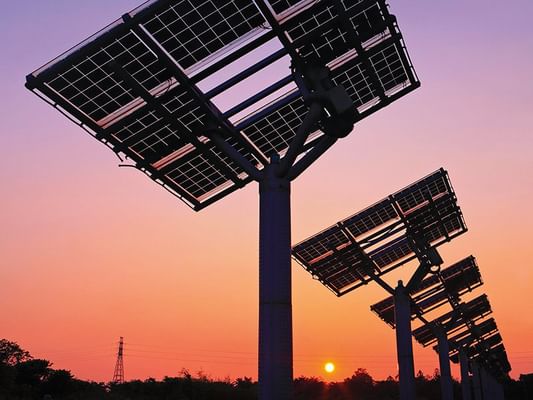- Undergraduate
Bachelor's Degrees
Bachelor of ArtsBachelor of EngineeringDual-Degree ProgramUndergraduate AdmissionsUndergraduate Experience
- Graduate
Graduate Experience
- Research
- Entrepreneurship
- Community
- About
-
Search
All Thayer News

Ask The Expert: Energy Transformation
Dec 01, 2021 | by Eun Lee Koh ’00 | Dartmouth Engineer

Image courtesy iStock.
At the Arthur L. Irving Institute for Energy and Society’s inaugural “Investing in Our Energy Futures” conference this spring, Dean Alexis Abramson engaged leading energy experts and thought leaders in a conversation about emerging energy technologies and the path forward to a sustainable energy future. Below are highlights from the event, hosted by Irving and Thayer’s “Great Issues in Energy” series.
On Emerging Technologies
DARREN PEERS ’96, Analyst, Capital Group: “We’re at an interesting intersection where technologies—on-shore wind and solar, nature-based offsets, carbon capture and sequestration, renewable fuels, renewable diesel from waste cooking oils, battery technology, off-shore wind, electric vehicles—are economical or very close to being so. And with government help, we can continue to bring down the cost curve. It will take a myriad of solutions to truly tackle emissions during the next number of decades.”
On How Innovations Have Shaped Policymaking
BRAD PLUMER ’03, Climate Reporter, The New York Times: “Fifteen years ago, when I started covering climate policy, the idea was that Congress would pass a climate plan, fund research, and technology would solve the problem. Those bills never passed. But through time—thanks to state and local efforts, engineers, and private companies and innovators—clean-energy technologies have emerged. Utilities pledge 70- to 80-percent emissions reduction even without government mandates, and states reach for 100-percent clean electricity. It has completely changed what companies set as goals and what policymakers are willing to talk about.”
On Energy Equity
ABBY ROSS HOPPER ’93, President and CEO, Solar Energy Industries Association: “We have to ask, ‘Who enjoys the benefits of clean energy? Who is creating wealth in this energy revolution? How do we center the communities impacted, but often not included, in these conversations?’ That’s a different way of setting policy priorities and engaging communities, empowering them, and seeing them as full partners. I see the opportunity to be intentional about how we share the benefits of this clean-energy job transition and make sure that the diversity of our energy workforce reflects the diversity of our country.”
PEERS: “A billion people in the world don’t have electricity today, and another 3 billion have no access to clean fuels for basic things like cooking. As we go through these transitions, some clean-energy solutions will cost more, and this will continue to create tension and inequity. If we’re not aware of this and the implications for those who are struggling just to pay the rent, we set ourselves up for failure. How do you split equitably the cost of this transition? These are complex issues, for sure, but an important policy debate and a huge challenge we have to tackle during the next decade.”
On How We Get There
PEERS: “There is tremendous capital being deployed into clean energy, both at an investment firm level and at a corporate level—billions of dollars into off-shore wind, hydrogen, biofuels, direct-air-capture technologies, and so forth. I’m optimistic that we will continue to reduce cost in all of these solutions.”
TOM KIERNAN ’81, CEO, American Rivers: “And when we have a clearer, more definitive policy about where we’re going, that will bring even more investors and even better returns. We also need societal evolution in how we site transmission. The process can take eight, 10, or 12 years, whether it’s hydrogen, batteries, off-shore wind, or solar. It’s not just about new technologies or finding better ways to use our existing grid. We need technology, yes, but also additional policies, incentives, and better strategies to deploy more transmission.”
HOPPER: “We need intentional investment in workforce. Folks are not just going to appear out of thin air to build tens of gigawatts of wind and solar and offshore wind. We have to train them, support them, and make sure our industry is diverse and equitable. At the local level this means supporting curriculum development, partnering with [historically Black colleges and universities], and making sure students know we need capable engineers in the clean-energy industry.”
For contacts and other media information visit our Media Resources page.
